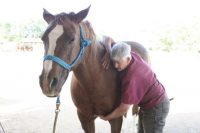Holistic Horsekeeping Newsletter, July 2022, Volume 27, Number 7 Dr. Madalyn Ward – How to have a healthy happy horse
How Damage Occurs
 Conventional western veterinarians are now recognizing and treating equine ulcers more frequently. With increased awareness of this syndrome, more horses are routinely being given antacids and acid blocking drugs. These medications may temporarily give relief only to set the horse up for more serious chronic health problems. The mucosal lining of the digestive tract is like an internal skin or barrier. What is inside the gut is actually outside the body. When the lining is healthy, it prevents bacteria, large protein molecules (antigens), and toxins from entering the blood. If it is not healthy, the blood becomes contaminated and in turn the internal organs, especially the liver, become damaged.
Conventional western veterinarians are now recognizing and treating equine ulcers more frequently. With increased awareness of this syndrome, more horses are routinely being given antacids and acid blocking drugs. These medications may temporarily give relief only to set the horse up for more serious chronic health problems. The mucosal lining of the digestive tract is like an internal skin or barrier. What is inside the gut is actually outside the body. When the lining is healthy, it prevents bacteria, large protein molecules (antigens), and toxins from entering the blood. If it is not healthy, the blood becomes contaminated and in turn the internal organs, especially the liver, become damaged.
A healthy mucosal lining has a protective barrier made of the mucous layer as well as large numbers of beneficial bacteria, which prevents toxins from having direct contact with the epithelial surface. Non-steroidal anti-inflammatory drugs interfere with secretion of mucous, and antibiotics decrease healthy gut flora (bacteria), so these drugs alone or in combination can set the stage for leaky gut syndrome. Antacids and acid-blocking drugs also upset the normal pH (acid/alkaline balance) in the intestinal tract, creating a hostile environment for healthy bacteria and an attractive environment for pathogenic bacteria.
Bacterial dysbiosis is an imbalance between normal and pathogenic gut flora. This condition creates a very unhealthy gastrointestinal system that then impairs proper digestion and absorption of nutrients and irritates the intestinal lining. Other causes of leaky gut syndrome include surgery, injury, chronic intestinal infection, drugs such as antibiotics and anti-inflammatories, malnutrition, and vaccinations.
Treatment
As with ulcers, prevention of leaky gut syndrome should be considered in the way you manage your horse. Keep stress down as much as possible by providing regular exercise and free choice hay. Keep vaccinations, antibiotics, and non-steroidal anti-inflammatory drugs to a minimum. Provide a high quality diet with a whole food source vitamin- mineral supplement such as Blue Green Algae. Nutrition is especially important if your horse is sick or injured. Once you see symptoms of leaky gut syndrome, treatment includes re-establishing healthy gut bacterial, healing and regenerating the mucosal lining, and support for the liver. I use Lean Muscle to heal the gut and re-establish healthy bacteria.
Blue Green Algae has been shown to help with leaky gut syndrome and it works well in combination with aloe vera and slippery elm bark. I have had success with giving therapeutic doses of human grade Acidophilus and Bifidus probiotics. I start with 6 Acidophilus in the AM and 6 Bifidus in the PM. This high dose needs to continue for at least 60 days and then can be lowered.
The Assure Guard Gold products provide prebiotic support. Some horses do better with prebiotics to prepare the gut environment so the good bacteria can maintain their numbers. During the process of rebalancing the gut bacteria it is best to feed a simple, low starch diet. Avoid multiple feeds or supplements that could trigger food sensitivities.
If your horse has chronic diarrhea and frequent abdominal pain, it may indicate more severe damage in the large intestine which prevents the digestion of fiber. In this case I add GI Tract to a protocol with Lean Muscle. These horses need a low fiber, moderate carbohydrate, and high fat diet to recover.
Treatment for leaky gut syndrome may have to continue for months to years until recovery is complete. Acupuncture, chiropractic, or homeopathy may speed the healing process. Many conventional veterinarians do not have much understanding of this condition. If you would like support in healing your horse from leaky gut I do offer homeopathic consultations.
++++ Copyright ++++
Unless otherwise attributed, all material is written and edited by Madalyn Ward, DVM. Copyright (c) 2021 HolisticHorsekeeping.com and Madalyn Ward, DVM. All rights reserved.
If you like the material in this newsletter please let your friends know about it. You may reprint material in other electronic or print publications provided the above copyright notice and a link to http://www.holistichorsekeeping.com is included in the credits.
You can get off this list by sending an email to info@holistichorsekeeping.com.
When you forward this material, please send the entire newsletter. Thanks!
Please also enjoy all of Dr. Ward’s web resources:
http://www.holistichorsekeeping.com
http://www.horsetemperament.com
http://blog.horseharmony.com
https://www.facebook.com/HolisticHorsekeeping
https://www.facebook.com/HorseHarmony